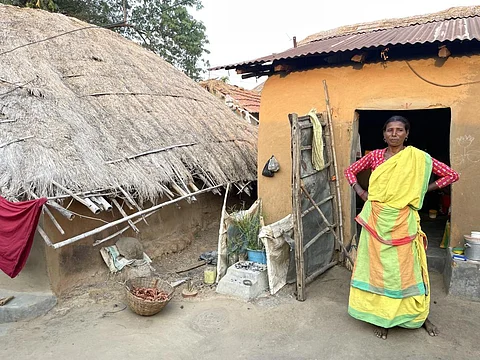

This is a ground report from seven villages in Purulia and Bankura districts in West Bengal.
Rural workers in West Bengal have had their right to work violated for over a year now. The Centre blocking funds to the state for work under the Mahatma Gandhi National Rural Employment Guarantee Scheme (MGNREGS) has led to many being pushed deeper into poverty and losing their homes.
The central government on December 21, 2021 invoked special provisions of the Mahatma Gandhi National Rural Employment Guarantee Act, 2005 (MGNREGA). Section 27 of the Act enabled it to “order stoppage of the release of funds to the scheme”, citing corruption and irregularities in its implementation.
Anil Tudu from Bandardiha village in Bankura district is one such MGNREGS worker whose leaky roof has him distraught. He fears that come monsoon and his roof will not be able to protect him and his family from the rains.
The region receives heavy rainfall in the monsoon and a single leak in the roof can destroy all valuables in a household.
“The monkeys in our area damaged many roofs in our village, including mine. Not all of us have been able to repair the damages,” he told Down To Earth during a ground visit to several villages in the state.
The 38-year-old said that his belongings will get drenchedin the rainwater and spoil without a safe roof. “I am helpless in keeping my family safe in my house,” he said. Once belongings such as mattresses, cots and other furniture rot, they will the little they have.
The situation is similar for least 44 houses in the village of 400 families.
Luski Murmu (45) from Babupara village in North 24 Parganas has been struggling for two square meals a day since MGNREGA work stopped. “We cannot think of repairing the house when there is no money for clothes or even food,” she said.
One of the rooms in the house she shares with her husband and in-laws is dilapidated and may fall apart any moment. “The room has been vacated and the family is adjusting in the remaining space for now,” she added.
Jasanoa from the same village said the central government was supposed to provide funds for 20 houses in the village under the Indira Awas Yojana, a housing scheme for the poor.
“These houses were to be built under the MGNREGS. The work has stopped and the houses were not built either. We are stuck in a loop,” she said.
Villagers have resorted to arrangements such as covering the roofs with plastic sheets or thatching the roofs with grass and straw. But these are temporary measures that will not survive the rainy season.
Houses in the region have slanted roofs so rainwater can roll off them, said Premchand, district coordinator at Pashchim Banga Khet Mazdoor Samiti (PBKMS).
“These sloping roofs are built from baked tiles to protect from heavy rainfall. Thatching with dried grass will be ineffective in the rains, but most of these workers now have no money,” he said.
The repair costs depend on the extent of damage to the roof or the house. “Workers usually borrow money for basic repairs if they have a source of income. But with no more jobs under MGNREGS, their borrowing power is now zero,” the PBKMS district coordinator added.
Registered workers are mandated to receive 100 days of work under MGNREGA. Thanks to the scheme, regular work often ensures a comfortable life for villagers if they get work for just 30-40 days, earning around Rs 213 per day.
The villagers claimed this was the first time in their lifetime they felt so miserable and helpless at not being able to take care of their basic needs. Many have resorted to daily wage work, which is inconsistent and pays much less.
Jasanoa said the entire village is facing a financial crisis in the absence of MGNREGA. Working at a brick kiln or roadwork gets them just Rs 150-200 a month.
“These jobs do not help meet our monthly expenses as they are available for only a week in a month. At times we have to spend a day’s salary on the transport,” she added.
The NGREGA Sangharsh Morcha, a non-profit, has raised the concerns of West Bengal workers to immediately release funds for unpaid wages and the comissioning of new work. The Centre owes over Rs 7,500 crore to the state, with a wage liability over Rs 2,760 crore.
This story is part of a series on the plight on MGNREGA workers in West Bengal. The first part can be found here and the second one here.